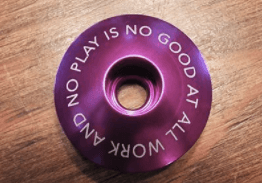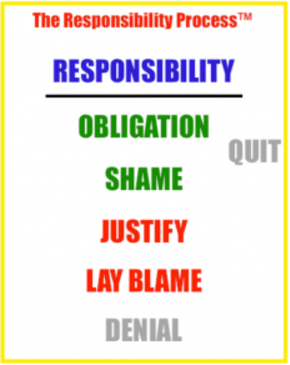Our original core values included “All Work and No Play is No Good At All” as one of our core values. We had borrowed the phrase from a bicycle stem cap that co-founder, Erik Troan, once saw. We wanted to have something around having work-life balance, and we wanted it to be unique.
When revisiting our values, we elected to strengthen this value to “Promote Life Outside Work” because we felt that we did more than balance work and life — we actively promoted a life outside of work.
One could argue that this is simply a byproduct of the situation of our founding team. We are all in our late thirties and early forties. We all have families, and we like our families.
One of my favorite people is Christopher Avery who writes and speaks about responsibility. Often when people at work (or within a business context) discuss spending time with family, it’s phrased as an obligation. “Gotta get home to the fam.” “Don’t have a hall pass tonight.” “[S]He’ll be angry at me if I don’t leave now.” It’s as if the person would rather be hanging out with colleagues than with their family, and it’s a struggle to get home. But that simply isn’t the case with our founding team. And since we do enjoy and prioritize spending times with our family, it would be completely hypocritical to not allow others. I’m not a fan of hypocrisy, so having this value ensures that we don’t go there.
Of course, this value is not without controversy. Society, especially in some technology and business circles, really do not like people to have a life outside of work. You’ll hear comments like, “let’s hire <insert name> they don’t have a life.” Of course, this implies that the person will spend every waking hour working — a common mistake in investment banking.

In Jason Lemkin’s post “22 reasons I won’t fund you” he lists “too much balance” as a reason. Our hero culture praises people that work many hours despite this being a total vanity metric. I’ve had people tell me the number of hours they’ve worked as if that was the measure of value and success. I would take 6 hours from my co-founder, Erik, rather than 12 hours from many people.
Balance Is Not Laziness
I can sort of understand this attitude because there is a Dark Side to the value. Too much balance could lead to a lack of intensity. Now, there’s nothing in this value around “not” wanting to be intense or win, but I understand that it’s easy to devolve into a “lazy” culture. The Dark Side of this value can be balanced by creating a culture of high expectations. Setting aggressive (yet achievable) goals and having a high bar for results drives intensity. We don’t mandate hours, but we have created a culture around expecting quality work in a reasonable timeframe. We set aggressive financial targets which require work to achieve.
Silicon Valley likes to praise its culture around work-life balance by encouraging play at work. This is often parodied in shows like HBO’s Silicon Valley, and to me, many of these examples are “faux-balance.” They include:
- Company dinner every night at work: Requiring (or guilting) employees to dine together every night for dinner is awful. It creates stress for employees simply to promote “camaraderie.”
- Gaming areas: I used to play ping pong — I, sadly, have a torn meniscus to prove this — and other games at the office. Playing these games didn’t take much away from my work — it simply took away from my family. I’d rather use my work time for working, and my play time for home. Of course, we have regular team-building events to build relationships, but it isn’t every day. And it’s intentional.
Here’s some unsolicited advice. Have a life outside of work. If you don’t have one, get one. It’s healthy. Work gets stressful. If you don’t have an outlet or refuge, you’ll be in a bad place for a long time. Everyone needs a break. Breaks help you cope with stress and regain your strength. While it may be counterintuitive, having a life outside of work actually makes you a better worker.